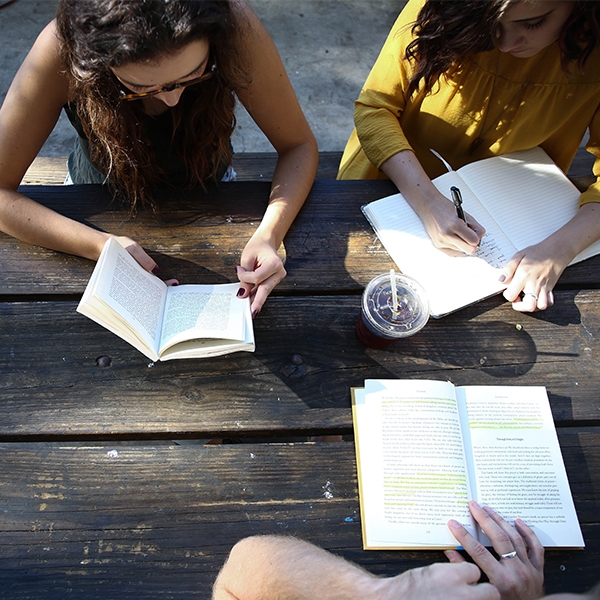The Benefits of Going Outside

Students studying outside on the grass (kali9, iStockPhoto)

Students studying outside on the grass (kali9, iStockPhoto)
How does this align with my curriculum?
| Grade | Course | Topic |
|---|
Spending time outside has important physical and psychological benefits. It can even help you learn better!
Has anyone in your class ever begged your teacher to give the lesson outside? I grew up in Ottawa, Ontario. My classmates and I used to beg for this quite often, especially on those beautiful days in May and June. For some reason, lessons that seemed boring inside became really enjoyable when we were surrounded by green space.
Scientists wouldn’t be surprised that we felt this way. Many of them have concluded that being around nature can cause all kinds of positive emotions in people. It can even improve just about every part of people’s lives! Let’s learn how going outside can help you physically, psychologically, and even in the classroom.
The physical benefits of going outside
Are you one of those people who would like to be more fit, but can’t quite find the motivation and discipline to exercise regularly? Some researchers suggest that exercising outdoors might help you. That’s because people tend to perceive outdoor exercise as easier.
For example, researchers asked participants in one study to walk for a period of time both indoors and outdoors. In each case, participants could set their own pace. Interestingly, they tend to walk faster outside. But they also believed they’d worked less hard outside!

The psychological benefits of going outside
Do you ever find yourself stressed out? Many of us experience this feeling from time to time. Luckily, there are a number of things we can do to relieve it. For example… you guessed it! Going outside.
Scientists can measure an individual’s stress levels through changes in blood pressure, heart rate, and how quickly we breathe in and out (our respiration rate). Measurements of these three things tend to be higher when we get stressed out, and lower when we relax.
When we spend even a little bit of time in a natural environment, these three measurements tend to drop. That means just a little time in nature can help de-stress you! If you suffer from stress often, try adding a little time outside into your daily routine. Studies suggest this can help your overall emotional well-being. And if you do feel anxious or depressed regularly, spending a bit of time outside can make these symptoms a little less severe.

Did you know?
A 2016 survey in the United Kingdom showed that 75% of British children spend less time outside than prison inmates.
You may be wondering, why is it that nature brings out positive emotions in us while indoor environments do not? One explanation is that, for thousands of years, the natural environment housed the resources we needed in order to stay alive, such as food and water. Back then, some of our ancestors enjoyed spending time outdoors and some did not. The ones who had more positive emotional experiences in natural environments would have been more motivated to spend time in these environments. These ancestors would have been more likely to survive and pass on their genes to subsequent generations.
The benefits of going outside at school
Are your teachers worried about students getting distracted during an outdoor class? Tell them there’s no need to worry! A 2013 study showed that Swedish high school students who attended outdoor math and biology classes were able to remember the material better than students who attended the same classes indoors. Students in the outdoor classes also participated more in the lessons compared to students in the indoor classes.

In a 2017 study on Norwegian preschool children, researchers found that playing outdoors may help prevent children develop inattention and hyperactivity symptoms.
Did you know?
When the concept of kindergarten was first introduced in the 1800s, it was supposed to be a garden for children, not of children.
Time to hit the books outside?
At this point, you might be thinking, why can’t we just have all classes outside? While this might sound like a good idea, it’s not always a very practical one. There are many things in the outdoor environment that teachers can’t control, such as the weather.
Also, even though many studies have shown that having classes outdoors has benefits, researchers still do not fully understand this process. A lot of different variables (factors) can affect this process. The characteristics of the student is one example. Course design is another. For example, in that 2013 Swedish study, did students participate more outside simply because they were outside… or because of the way the class was designed?
In addition, some studies have shown that outdoor education doesn't necessarily have positive effects.
This is not to say that we should not try to do more teaching outdoors. But teachers and educators should be aware that it’s probably not a magic solution.
There are definitely benefits to simply being outside. So no matter where you are, finding the closest bit of green space and taking advantage of it is sure to be worthwhile. Next time you’re bored on a nice day, try stepping outside and feeling the benefits of fresh air!
Starting Points
- Would you like to have lessons outside? Why or why not?
- Do you think some classes are better suited to outdoor lessons than others? If so, which ones? Explain your answer.
- The article states that even a little bit of time outside can reduce stress levels almost instantly. Have you ever experienced this? If so, describe the situation.
- Do you spend time outside regularly? If so, how? If not, why not? And if not, how would it be easy to make outdoor time part of your daily schedule? List any factors that would have to change (school/work schedule, personal responsibilities, available green space where you work/live, etc.)
- Should schools make it mandatory for students to spend time outside every day? Why or why not?
- If going outside is beneficial, is there also a benefit to bringing features of the outdoors inside (e.g., trees, water, plants, animals)? Can you think of places where it is common to bring outdoor features inside a building?
- What are some of the psychological benefits of going outside?
- What are some of the physical benefits of going outside?
- Which body systems are impacted when stressed? How can we measure stress levels?
- Have you seen any advertisements that promote going outdoors? What types of companies or organizations promote going outdoors? Are these companies or organizations trying to sell products or ideas?
- Do governments ever promote or advertise the benefits of going outdoors? If so, why do they do this?
- Scientific knowledge is based on gathering empirical evidence. What kinds of measurable evidence is used to determine a person’s psychological state?
- Why is statistical data important to the research of psychologists?
- How can the design of a research study impact the results?
- Teachers could use this article to support health and wellness curricula, specifically, factors that contribute to healthy living.
- After reading the article students could complete a Silent Discussion/Graffiti activity in which the students discuss the benefits they feel they derive from working, studying or spending time outside. The ready-to-use Silent Discussion/Graffiti reproducibles are available in [Google doc] and [PDF] formats.
- Students could debate the value of holding lessons outside versus inside using a Pros & Cons Organizer to prepare arguments for the debate. Ready-to-use Pros & Cons reproducibles are available in [Google doc] and [PDF] formats.
Connecting and Relating
- Would you like to have lessons outside? Why or why not?
- Do you think some classes are better suited to outdoor lessons than others? If so, which ones? Explain your answer.
- The article states that even a little bit of time outside can reduce stress levels almost instantly. Have you ever experienced this? If so, describe the situation.
- Do you spend time outside regularly? If so, how? If not, why not? And if not, how would it be easy to make outdoor time part of your daily schedule? List any factors that would have to change (school/work schedule, personal responsibilities, available green space where you work/live, etc.)
Relating Science and Technology to Society and the Environment
- Should schools make it mandatory for students to spend time outside every day? Why or why not?
- If going outside is beneficial, is there also a benefit to bringing features of the outdoors inside (e.g., trees, water, plants, animals)? Can you think of places where it is common to bring outdoor features inside a building?
Exploring Concepts
- What are some of the psychological benefits of going outside?
- What are some of the physical benefits of going outside?
- Which body systems are impacted when stressed? How can we measure stress levels?
Media Literacy
- Have you seen any advertisements that promote going outdoors? What types of companies or organizations promote going outdoors? Are these companies or organizations trying to sell products or ideas?
- Do governments ever promote or advertise the benefits of going outdoors? If so, why do they do this?
Nature of Science/Nature of Technology
- Scientific knowledge is based on gathering empirical evidence. What kinds of measurable evidence is used to determine a person’s psychological state?
- Why is statistical data important to the research of psychologists?
- How can the design of a research study impact the results?
Teaching Suggestions
- Teachers could use this article to support health and wellness curricula, specifically, factors that contribute to healthy living.
- After reading the article students could complete a Silent Discussion/Graffiti activity in which the students discuss the benefits they feel they derive from working, studying or spending time outside. The ready-to-use Silent Discussion/Graffiti reproducibles are available in [Google doc] and [PDF] formats.
- Students could debate the value of holding lessons outside versus inside using a Pros & Cons Organizer to prepare arguments for the debate. Ready-to-use Pros & Cons reproducibles are available in [Google doc] and [PDF] formats.
Learn more
How Just 15 Minutes in Nature Can Make You Happier (2017)
Article from Time on the benefits of spending time in nature settings, like parks and forests.
References
Becker, C., Lauterbach, G., Spengler, S., Dettweiler, U., & Mess, F. (2017). Effects of regular classes in outdoor education settings: A systematic review on students' learning, social and health dimensions. International Journal of Environmental Research and Public Health, 14(5), 485. DOI: 10.3390/ijerph14050485
Fägerstam, E., & Blom, J. (2013). Learning biology and mathematics outdoors: effects and attitudes in a Swedish high school context, Journal of Adventure Education and Outdoor Learning, 13(1), 56-75, DOI: 10.1080/14729679.2011.647432
Gladwell, V. F., Brown, D. K., Wood, C., Sandercock, G. R., & Barton, J. L. (2013). The great outdoors: How a green exercise environment can benefit all. Extreme Physiology & Medicine, 2(1). DOI:10.1186/2046-7648-2-3